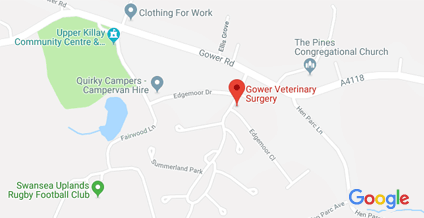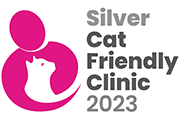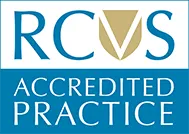We are open for emergenices only 9am-12pm on bank holiday Monday. Please click here to view the latest information on how to access our services.
Rabbits are usually neutered around four months of age. Castration involves removing the testes of a male rabbit, and spaying is the removal of the uterus and ovaries of a female. It is worth noting that sperm can reside in the genital tract for up to six weeks, so it’s best to keep your rabbit away from un-neutered females during this time. Rabbits are extremely social creatures; neutering helps pair or bond rabbits, making them much happier.
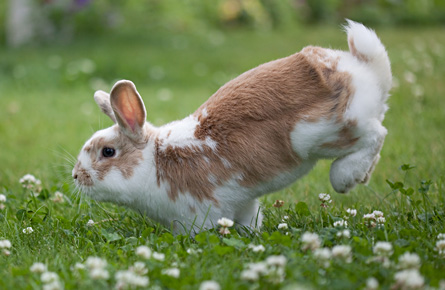 Neutering your rabbit:
Neutering your rabbit:
- Prevents unwanted pregnancies and womb infections
- Can help prevent tumours and breast cancer
- Can also help prevent testicular cancer and prostate disease
- Assists in preventing roaming and aggressive behaviour
Should I let my rabbit have one litter before spaying her?
This happens to be a common question, and there are no known health benefits to letting your rabbit have a litter; this is also the same for dogs and cats.
General anaesthesia
Your pet requires a general anaesthetic for neutering; here at Gower Vets, we have measures in place to ensure their safety during the procedure. A dedicated Registered Veterinary Nurse (RVN) will monitor your pet throughout their surgery and recovery. Although rabbits are deemed to be a ‘high risk’ under anaesthesia, the health benefits alone far outweigh the risks; over the years, rabbit anaesthesia has become much safer.
Risk levels of anaesthesia increase with a pet’s age, certain breeds and if your pet has any underlying health conditions. Your pet will receive a premedication to relax them and will also receive two types of pain relief. Rest assured the Gower team will be with your pet every step of the way.
Your pet will stay the day with us
On admission, we will discuss the procedure and go through the consent form. Please note we must gain a signature from the registered owner (over 18) or authorised agent on the consent form. Your dog, cat or rabbit will be admitted as a ‘day patient’, and they will be discharged later that day once our team are happy with how your pet has recovered. During your pet’s discharge appointment, the team will go through everything you need to know about caring for your pet after their surgery and their pain relief medication. We are always at the end of the telephone for you and your pet, so please contact us on 01792 299111 if you have any further questions once you have your pet settled back at home.
Please bring your rabbit in a secure box or basket with a blanket that smells of home; we advise rabbits are brought along with their companions to reduce the stress of separation between a bonded pair. Bringing your rabbits lunch is also preferable. We require rabbits to eat relatively quickly after a general anaesthetic; having their favourite foods on hand speeds up their recovery time so we can have your rabbit back home with you as soon as possible.
Pet Health for Life Plan
Gower's Pet Health for Life Plan members can claim a 10% discount off any neutering procedure. Our health club offers preventative health, and you could be saving each year on what you spend on your pet treatment wise.
Further reading:
Cats reach reproductive maturity rapidly; we follow the RSPCA and Cats Protection guidelines recommending neutering both female and male cats around four months of age. Female cat neutering involves removing their ovaries and uterus. Castrating a male cat involves removing both of their testes.
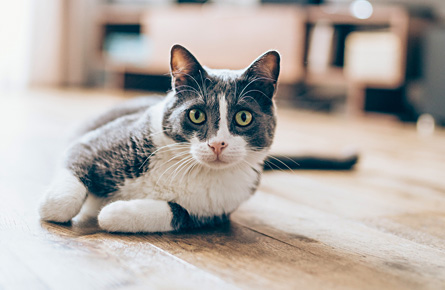 Cat neutering or spaying:
Cat neutering or spaying:
-
Prevents unwanted pregnancies and womb infections
-
Can help prevent tumours and breast cancer
-
Can also help prevent testicular cancer and prostate disease
-
Assists in preventing roaming and aggressive behaviour
It’s normal to neuter! 86% of owned cats in the UK are neutered*
*PSDA Paws report 2020
Should I let my cat have one litter before spaying her?
This happens to be a common question, and there are no known health benefits to letting your cat have a litter; this is also the same for dogs and rabbits.
General anaesthesia before cat neutering
A general anaesthetic is required for cat neutering; here at Gower Vets we have measures in place to ensure their safety during the procedure. A dedicated Registered Veterinary Nurse (RVN) will monitor your pet throughout their surgery and recovery. All anaesthesia comes with some form of risk; however, these are very low, especially neutering, as pets are often young, fit, and healthy when having this procedure.
Risk levels of anaesthesia increase with a pet’s age, certain breeds and if your pet has any underlying health conditions. We can perform a pre-anaesthetic blood test before your pet’s surgery to detect any underlying illnesses; this can be discussed when booking in for the procedure and on the day of their surgery. Your pet will receive a premedication to relax them and will also receive two types of pain relief. Rest assured the Gower team will be with your pet every step of the way.
Your pet will stay the day with us
On admission, we will discuss the procedure and go through the consent form. Please note we must gain a signature from the registered owner (over 18) or authorised agent on the consent form. Your dog, cat or rabbit will be admitted as a ‘day patient’, and they will be discharged later that day once our team are happy with how your pet has recovered. During your pet’s discharge appointment, the team will go through everything you need to know about caring for your pet after their surgery and their pain relief medication. We are always at the end of the telephone for you and your pet, so please contact us on 01792 299111 if you have any further questions once you have your pet settled back at home.
Please bring your cat in a secure cat basket with a blanket that smells of home. Cats are territorial creatures who prefer to stay in areas familiar to them; click here to read how you can prepare for travelling to us with your cat.
Pet Health for Life Plan
Gower's Pet Health for Life Plan members can claim a 10% discount off any cat neutering procedure. Our health club offers preventative health, and you could be saving each year on what you spend on your pet treatment wise.
Further reading:
In male dog neutering, both testes are removed; this is known as ‘castration’. In female dog neutering, either the uterus is removed or both the uterus and the ovaries; this is known as ‘spaying’.
Spaying a female dog eliminates the ability to reproduce, and your dog will no longer come into season. Females can be neutered from six months of age; for most breeds, we suggest spaying females before they have had a season, known as pre-season. If your dog is older than six months or has already started having seasons, we would need to wait three months after a season to ensure we are operating at the best possible time.
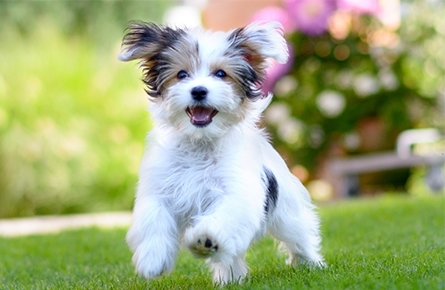 Dog Neutering or Spaying:
Dog Neutering or Spaying:
-
Prevents unwanted pregnancies and womb infections
-
Can help prevent tumours and breast cancer
-
Can also help prevent testicular cancer and prostate disease
-
Assists in preventing roaming and aggressive behaviour
-
It’s normal to neuter! 71% of owned dogs in the UK are neutered*
*PSDA Paws report 2020
At what age are dogs neutered or spayed?
Dog neutering is usually carried out at around six months of age for males and pre-season for female dogs, reducing the likelihood of females developing mammary cancer. We would also consider your dog’s breed, size, overall behaviour and other risk factors to provide the most suitable recommendation for your dog based on the latest evidence.
Male dogs older than six months can be neutered at any stage; however, we would still consider the dog’s breed, size, overall behaviour and other risk factors upon discussion of the procedure.
If your dog is not spayed before her first season, we would wait three months after the season.
Should I let my dog have one litter before spaying her?
This happens to be a common question, and there are no known health benefits to letting your dog have a litter; this is also the same for cats and rabbits.
General anaesthesia
A general anaesthetic is required for dog neutering; here at Gower Vets we have measures in place to ensure their safety during the procedure. A dedicated Registered Veterinary Nurse (RVN) will monitor your pet throughout their surgery and recovery. All anaesthesia comes with some form of risk; however, these are very low, especially neutering, as pets are often young, fit, and healthy when having this procedure.
Risk levels of anaesthesia increase with a pet’s age, certain breeds and if your pet has any underlying health conditions. We can perform a pre-anaesthetic blood test before your pet’s surgery, to detect any underlying illnesses; this can be discussed when booking in for the procedure and on the day of their surgery. Your pet will receive a premedication to relax them and will also receive two types of pain relief. Rest assured the Gower Vets team will be with your pet every step of the way.
Your pet will stay the day with us
On the day of the procedure, please bring your dog on a secure harness or lead; during the admission appointment, we will discuss the procedure and go through the consent form. Please note we must gain a signature from the registered owner (over 18) or authorised agent on the consent form. Your dog, cat or rabbit will be admitted as a ‘day patient’, and they will be discharged later that day once our team are happy with how your pet has recovered.
During your pet’s discharge appointment, the team will go through everything you need to know about caring for your pet after their surgery and their pain relief medication. We are always at the end of the telephone for you and your pet, so please contact us on 01792 299111 if you have any further questions once you have your pet settled back at home.
Pet Health for Life Plan
Gower's Pet Health for Life Plan members can claim a 10% discount off any neutering procedure. Our health club offers preventative health, and you could be saving each year on what you spend on your pet treatment wise.
Further reading:
Did you know… neutering can have significant preventative health care benefits for your pet?
Whether you have a new puppy or kitten at home, or a slightly older pet, neutering can play an essential part in their healthcare for a happy and healthy lifestyle.
At Gower Vets your pet is in the safest of hands. We have a team of experienced veterinary surgeons and registered veterinary nurses along with the best facilities to ensure your pets are well looked after.
What’s more, members of our Pet Health for Life plan can claim a 10% discount on any neutering treatment following an initial consultation with one of our vets to discuss when’s the right time for your pet.
Book an appointment Pet Laparoscopic (keyhole) Surgery Make a Laparoscopic Referral
Benefits of Pet Neutering
Pet neutering is a surgical procedure performed under general anaesthesia to remove part or all of an animal’s reproductive organs, preventing them from reproducing. In males, it is called castration and in females, spaying.
- Prevents unwanted pregnancies and womb infections
- Can help prevent tumours and breast cancer
- Can also help prevent testicular cancer and prostate disease
- Assists in preventing roaming and aggressive behaviour
- It’s normal to neuter! 86% of owned cats and 71% of owned dogs in the UK are neutered*
*PSDA Paws report 2020
When's the right time for my pet?
|
|
Male |
Female |
|
Cat Neutering |
From four months |
From four months |
|
Dog Neutering |
From six months although we will consider your pet’s weight, breed and behaviour |
Pre-season or at least three months after season |
Click on the links below to find out more.
Whether it’s your first visit to Gower Vets or you’ve been here before your pet will need an initial consultation to establish whether there are any issues that need attention.
Consultations can be used to investigate specific symptoms or injuries you may have noticed in your pet, or as a general health and wellbeing assessment when you register your pet with us for the first time. If you have a new kitten or puppy who needs a microchip, we’ll book them in for a consultation to check them over first.
One of our highly trained and experienced vets and nurses will welcome you into a private consultation room. We will ask you for any information that may be useful; like changes in your pet’s behaviour or eating habits. If your pet is already registered with us, we’ll also review their medical records and history. We’ll then conduct a thorough physical check of your pet, concentrating on any particular areas where you may be concerned there’s a problem.
If the initial consultation reveals any cause for concern, our vets and nurses will agree next steps with you. This could include medication, x-rays, referral to a nurse clinic, or further investigation. We’ll keep you informed every step of the way.
Please contact your local Gower Vets in Swansea for information on the cost of a consultation for your pet.
Unable to come to the practice?
If you’re unable to visit us in practice, we may be able to help remotely. We can offer a consultation by telephone and video. Your appointment will be with one of our highly qualified vets who will give you the same time and level of detail as you would expect in practice. In many cases we can make a diagnosis and prescribe medication if necessary. If we’re unable to reach a satisfactory conclusion by telephone and video then we may need to physically see your pet; either as an emergency or at a follow up appointment which we can book for you there and then.
Page 6 of 8
-
Veterinary Surgeon
Location: 68-31 Edgemoor Close, Upper Killay, SwanseaHours: Full timePractice: Gower Veterinary SurgerySalary: £60,000 per annum, £4,000 welcome bonus, Salary up to and dependent on experienceRead more


